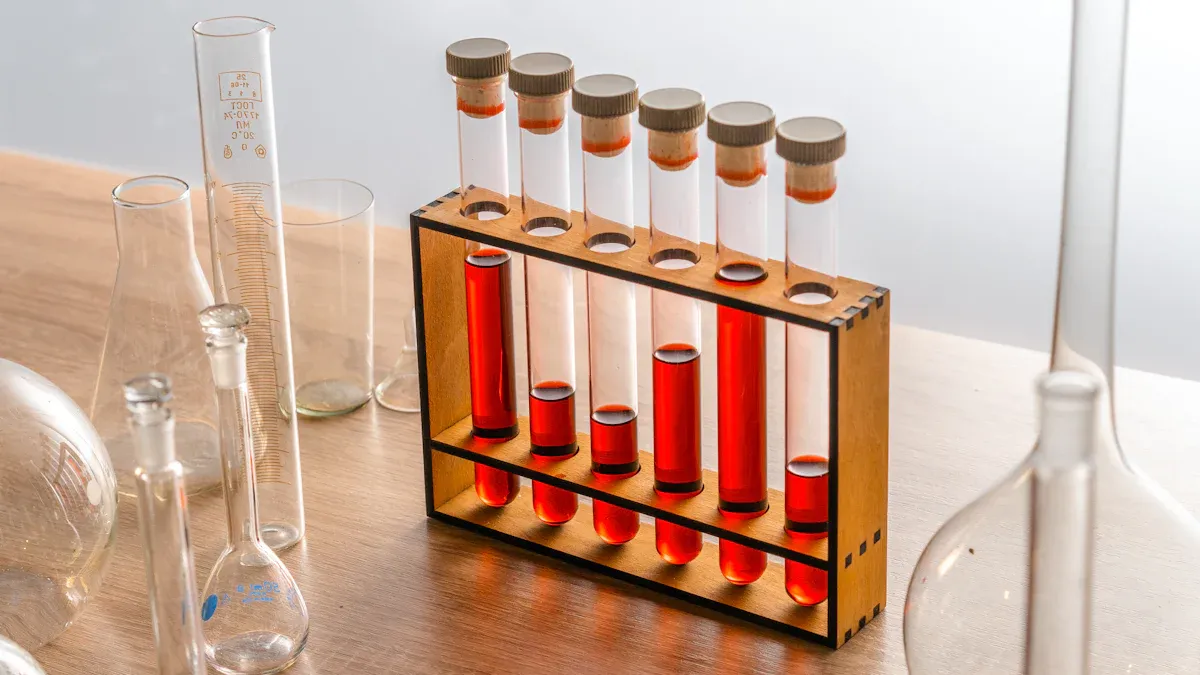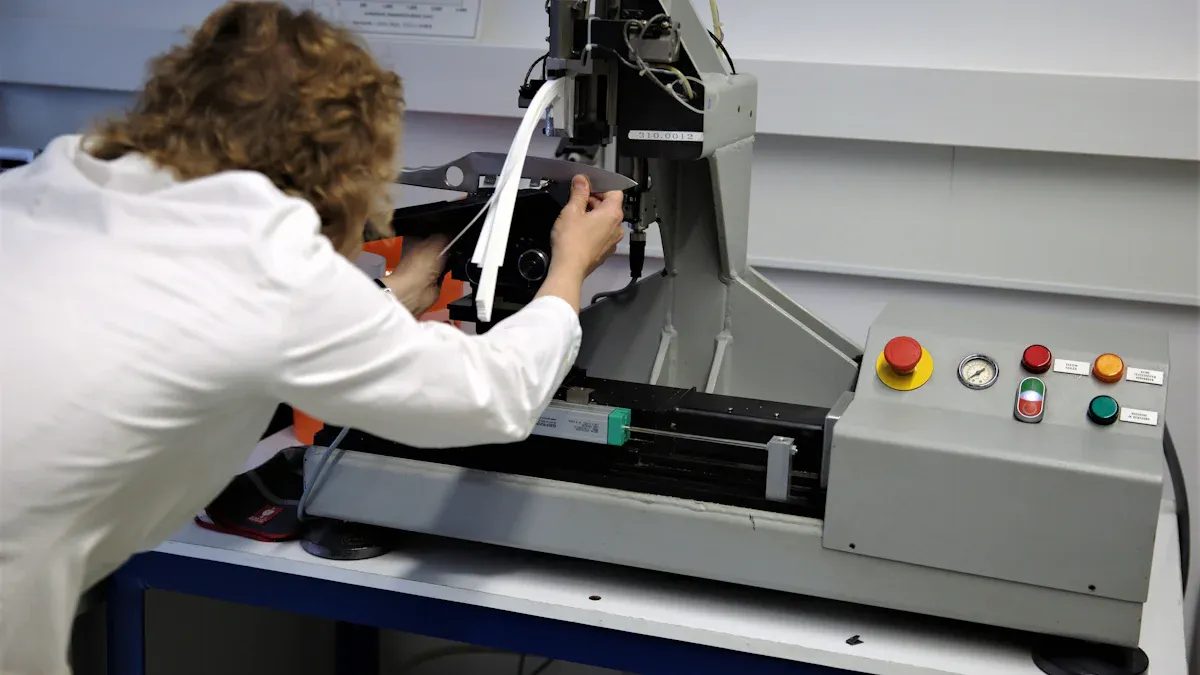Comparing the Tensile Strength of Nitinol Tubing with Stainless Steel

Tensile strength plays a critical role in determining a material's suitability for various applications, including Nitinol tubing tensile strength. It measures how much stress a material can withstand before breaking, making it essential for industries like medical, aerospace, and automotive. Statistical data highlights its importance: mean values ensure materials meet standards, while low standard deviation indicates reliability. For example, Nitinol tubing demonstrates unique superelastic properties with tensile strength values around 500 MPa at room temperature. In comparison, stainless steel and titanium alloys offer tensile strengths of approximately 550 MPa and higher, depending on the grade. Understanding these differences, including the specific Nitinol tubing tensile strength, helps engineers select the right material for specific needs, ensuring safety and performance.
Key Takeaways
Nitinol tubing is super stretchy and returns to shape, perfect for medical tools.
Stainless steel is strong and useful for many things but is less bendy than Nitinol.
Titanium alloys are strong and light, great for airplanes, but cost more.
Engineers should think about strength, rust resistance, and safety when picking materials.
AccuPath's Nitinol tubing works well every time, making it great for important uses in healthcare and more.
Material Overview
Nitinol Tubing
Composition and Unique Properties
Nitinol, a nickel-titanium alloy, stands out due to its shape memory effect and superelasticity. These properties allow it to recover its original shape when heated above its transformation temperature or after significant deformation. Nitinol can handle mean strains of up to 4% and transformation strains of around -4.1%. Its durability enables it to endure repeated deformation cycles, making it ideal for demanding applications. Additionally, its biocompatibility and corrosion resistance make it suitable for long-term use in medical implants.
Property | Description |
|---|---|
Shape Memory Effect | Recovers its original shape when heated above its transformation temperature. |
Superelasticity | Returns to its original shape after deformation without permanent damage. |
Biocompatibility | Non-toxic and well-tolerated by the human body. |
Corrosion Resistance | Resists corrosion, enhancing longevity in medical and industrial applications. |
AccuPath offers high-quality Nitinol tubing, ensuring reliability and precision for critical applications.
Common Applications of Nitinol Tubing
Nitinol tubing is widely used in medical devices, such as stents, guidewires, and orthodontic archwires. Its superelasticity and biocompatibility make it indispensable in minimally invasive surgeries. Beyond healthcare, it finds applications in robotics and aerospace, where flexibility and durability are crucial.
Stainless Steel
Composition and Key Properties
Stainless steel is an iron-based alloy containing approximately 18% chromium, which provides excellent corrosion resistance. Its strength and durability make it a versatile material for various industries. Different grades of stainless steel offer varying mechanical properties, allowing customization for specific needs.
Common Applications of Stainless Steel
Stainless steel is a staple in construction, automotive, and medical industries. It is commonly used in surgical tools, kitchenware, and structural components. Its affordability and availability make it a preferred choice for large-scale applications.
Titanium Alloys
Composition and Key Properties
Titanium alloys combine lightweight properties with exceptional strength, making them 30% stronger than steel but 43% lighter. They exhibit superior corrosion resistance, especially in harsh environments, and are biocompatible, making them ideal for medical implants.
Common Applications of Titanium Alloys
Titanium alloys are widely used in aerospace, military, and medical fields. They are essential in aircraft components, prosthetics, and dental implants. However, their high cost limits their use in commercial applications compared to stainless steel.
Nitinol Tubing Tensile Strength vs Stainless Steel and Titanium Alloys

Tensile Strength of Nitinol Tubing
Typical tensile strength values
Nitinol tubing exhibits impressive tensile strength, typically ranging from 500 MPa to 900 MPa, depending on its processing and composition. Research highlights that sputtered Nitinol achieves a maximum local strain of over 4%, while process-optimized tubes can reach up to 6%. These values demonstrate the material's ability to endure significant stress without permanent deformation, making it a reliable choice for demanding applications.
Specimen Type | Maximum Local Strain |
|---|---|
Sputtered Nitinol | >4% |
Process-optimized Tube | 6% |
AccuPath's Nitinol tubing offers consistent tensile strength, ensuring reliability for critical applications in medical and industrial fields.
Factors influencing Nitinol's tensile strength
Several factors affect the tensile strength of Nitinol tubing:
Manufacturing techniques: Tube manufacturing methods, such as TM-1 and TM-2, significantly impact performance.
Material composition: Controlling oxygen and carbon content during the melting process enhances strength.
Thermomechanical processing: Cold working and heat treatment optimize the material's properties.
Surface characteristics: The formation of titanium oxides and carbides influences durability and fatigue resistance.
These factors highlight the importance of precise manufacturing processes in achieving high tensile strength for Nitinol tubing.
Tensile Strength of Stainless Steel
Typical tensile strength values
Stainless steel offers a wide range of tensile strength values, depending on its grade. For example, austenitic stainless steel typically has a tensile strength of 600 MPa, while precipitation-hardening grades can exceed 1100 MPa. This versatility makes stainless steel suitable for various applications requiring strength and durability.
Stainless Steel Family | Tensile Strength (MPa) | Yield Strength (MPa) |
|---|---|---|
Austenitic | 600 | 250 |
Duplex | 700 | 450 |
Ferritic | 500 | 280 |
Martensitic | 650 | 350 |
Precipitation Hardening | 1100 | 1000 |

Variations across stainless steel grades
Different grades of stainless steel exhibit unique properties. For instance, 304 stainless steel, commonly known as A2, has a tensile strength of approximately 515 MPa and is widely used due to its affordability and corrosion resistance. On the other hand, 316 stainless steel (A4) offers similar tensile strength but enhanced resistance to harsh environments, thanks to its molybdenum content.
Tensile Strength of Titanium Alloys
Typical tensile strength values
Titanium alloys are renowned for their high tensile strength, typically ranging from 900 MPa to 1200 MPa. This strength, combined with their lightweight nature, makes them ideal for applications requiring both durability and reduced weight.
Comparison with Nitinol and stainless steel
When compared to Nitinol tubing and stainless steel, titanium alloys stand out for their superior strength-to-weight ratio. However, Nitinol's unique superelasticity and shape memory properties provide advantages in applications requiring flexibility and deformation recovery. Stainless steel, while not as strong as titanium, offers cost-effectiveness and versatility, making it a popular choice for many industries.
Comparative Analysis
Direct comparison of tensile strength values
Nitinol tubing, stainless steel, and titanium alloys each exhibit distinct tensile strength ranges. Nitinol tubing typically achieves tensile strength values between 500 MPa and 900 MPa, depending on its processing. Stainless steel, on the other hand, offers a broader range, with grades like austenitic stainless steel reaching 600 MPa, while precipitation-hardening grades exceed 1100 MPa. Titanium alloys surpass both materials, with tensile strengths ranging from 900 MPa to 1200 MPa.
Material | Tensile Strength Range (MPa) | Unique Characteristics |
|---|---|---|
Nitinol Tubing | 500–900 | |
Stainless Steel | 600–1100+ | Versatility across grades |
Titanium Alloys | 900–1200 | High strength-to-weight ratio |
While titanium alloys lead in raw tensile strength, Nitinol tubing offers unmatched flexibility and deformation recovery. Stainless steel provides a balance of strength and affordability, making it a versatile choice for many industries. AccuPath's Nitinol tubing ensures consistent tensile strength, making it a reliable option for critical applications.
Performance differences in various conditions
Material performance often depends on environmental and operational conditions. Nitinol tubing excels in applications requiring flexibility and fatigue resistance, such as medical devices. Its superelasticity allows it to endure repeated deformation without permanent damage. Stainless steel performs well in corrosive environments, especially grades like 316, which resist harsh chemicals. However, it lacks the shape memory properties of Nitinol. Titanium alloys shine in high-stress and lightweight applications, such as aerospace components, due to their superior strength-to-weight ratio.
Tip: For applications requiring both flexibility and durability, Nitinol tubing offers a unique advantage. AccuPath's precision-engineered Nitinol tubing ensures optimal performance in demanding environments.
Each material has strengths tailored to specific needs. Engineers must evaluate tensile strength alongside other properties, such as corrosion resistance and weight, to select the best material for their application.
Application-Specific Analysis
Medical Applications
Importance of tensile strength in medical devices
Tensile strength plays a critical role in the design and reliability of medical devices. It ensures that materials can withstand the stresses encountered during use without breaking or deforming. For instance, the FDA emphasizes the inclusion of tensile strength metrics in non-clinical performance testing to ensure the safety and effectiveness of medical devices. This property is particularly vital for devices like stents and guidewires, which experience repeated deformation during deployment and use. A comprehensive guide on tensile testing highlights its importance in maintaining the reliability of materials used in medical implants, ensuring patient safety and device longevity.
Material performance in medical applications
Nitinol tubing demonstrates exceptional performance in medical applications due to its unique properties. Its superelasticity and shape memory effect allow it to recover its original shape after deformation, making it ideal for minimally invasive procedures. Additionally, its biocompatibility and corrosion resistance enhance its suitability for long-term use in medical implants. Compared to stainless steel and titanium alloys, Nitinol offers unmatched flexibility and deformation recovery, which are critical for dynamic medical environments. AccuPath's precision-engineered Nitinol tubing ensures consistent performance, making it a trusted choice for medical applications.
Aerospace Applications
Role of tensile strength in aerospace components
In aerospace engineering, tensile strength is essential for ensuring the structural integrity of critical components like wings and fuselage. These parts endure immense stress during flight and must maintain their performance under extreme conditions. Research underscores the importance of tensile strength at yield in preventing material failure, which could compromise safety and functionality. This property ensures that aerospace components can withstand operational loads without permanent deformation or fracture.
Material preferences in aerospace
Titanium alloys are often preferred in aerospace applications due to their high strength-to-weight ratio. However, Nitinol tubing offers unique advantages in specific scenarios. Its superelasticity and fatigue resistance make it suitable for components requiring flexibility and repeated deformation. Stainless steel, while less lightweight, provides cost-effective solutions for less critical parts. AccuPath's Nitinol tubing delivers reliable performance, making it a valuable material for specialized aerospace applications.
Automotive Applications
Tensile strength in automotive design
Tensile strength is a key factor in automotive engineering, directly influencing vehicle stability and passenger safety. Materials with high tensile strength ensure that structural components can withstand impacts and stresses without failure. Studies highlight its importance in maintaining the overall performance of vehicles, particularly in crash scenarios where material integrity is crucial.
Material performance in automotive applications
Stainless steel remains a popular choice in automotive design due to its affordability and versatility. Titanium alloys, with their superior strength-to-weight ratio, are used in high-performance vehicles. Nitinol tubing, though less common, offers unique benefits in applications requiring flexibility and durability. Its superelasticity and fatigue resistance make it suitable for components like suspension systems and actuators. AccuPath's Nitinol tubing provides consistent performance, ensuring reliability in demanding automotive environments.
Advantages and Limitations of Nitinol, Stainless Steel, and Titanium Alloys

Nitinol Tubing
Advantages of Nitinol tubing
Nitinol tubing offers several unique benefits, making it a preferred choice for medical devices. Its superelasticity allows it to recover its shape after deformation, ensuring durability in dynamic environments. This property is particularly valuable in applications requiring flexibility, such as stents and guidewires. Nitinol's biocompatible nature ensures it is safe for long-term use in the human body. Additionally, its excellent corrosion resistance enhances its longevity in medical and industrial applications.
Thermal activated nickel titanium alloys, like those used in AccuPath's Nitinol tubing, provide consistent performance under stress. These alloys exhibit a plateau tension around 500 MPa at room temperature, which varies with thermal conditions. High-strength nickel titanium alloys can match the strength of stainless steel in specific designs, offering a balance of flexibility and reliability.
Limitations of Nitinol tubing
Despite its advantages, Nitinol tubing has limitations. Its high cost makes it less accessible for some applications. Limited machinability poses challenges during manufacturing, especially for complex designs. Studies also highlight its reduced high-cycle fatigue limit compared to other materials, which may lead to fractures under prolonged stress.
Feature | Observation |
|---|---|
High-Cycle Fatigue | Reduced fatigue limit compared to other materials. |
Stressed Volume Impact | Larger stressed volumes activate more crack nucleation sites, increasing fractures. |
Stainless Steel
Advantages of stainless steel
Stainless steel is widely used due to its high tensile strength and corrosion resistance. It can endure significant stress before deforming, making it suitable for medical devices, construction, and industrial processes. Its durability ensures long-term performance in harsh environments. Certain grades, like 17-PH, even surpass the tensile strength of some titanium alloys, showcasing its versatility.
Limitations of stainless steel
While stainless steel offers many benefits, it has drawbacks. Its weight makes it less suitable for applications requiring a high strength to weight ratio. Additionally, its cost can be higher than other metals, depending on the grade.
Titanium Alloys
Advantages of titanium alloys
Titanium alloys combine lightweight properties with exceptional strength, making them ideal for aerospace and medical applications. Their high strength to weight ratio ensures durability without adding unnecessary mass. Titanium is also biocompatible, making it suitable for implants and other medical devices.
Limitations of titanium alloys
Titanium alloys are expensive, limiting their use in cost-sensitive applications. Their machinability is also lower than stainless steel, increasing production challenges. Despite their strength, they lack the flexibility of thermal activated nickel titanium alloys, which are better suited for dynamic environments.
AccuPath's Nitinol tubing provides a reliable alternative to titanium alloys and stainless steel, offering unmatched flexibility and biocompatibility for critical medical applications.
Nitinol tubing, stainless steel, and titanium alloys each offer unique tensile strength ranges and characteristics. Titanium alloys lead with tensile strengths up to 1200 MPa, while stainless steel provides versatility across grades, reaching over 1100 MPa. Nitinol tubing, with its 500–900 MPa range, stands out for its superelasticity and shape memory effect, making it ideal for dynamic applications.
Selecting the right material depends on application needs. Engineers should prioritize Nitinol tubing for flexibility and fatigue resistance, stainless steel for cost-effective durability, and titanium alloys for lightweight strength. AccuPath’s precision-engineered Nitinol tubing ensures consistent performance, making it a reliable choice for critical industries.
Note: Tensile strength is vital, but factors like corrosion resistance, biocompatibility, and cost must also guide material selection.
FAQ
What makes Nitinol tubing unique compared to stainless steel and titanium alloys?
Nitinol tubing offers superelasticity and shape memory properties, allowing it to recover its shape after deformation. These features make it ideal for dynamic applications like medical devices. AccuPath's Nitinol tubing ensures consistent performance, combining flexibility and durability unmatched by stainless steel or titanium alloys.
How does tensile strength affect material selection?
Tensile strength determines how much stress a material can endure before breaking. It is crucial for applications requiring durability and reliability. For example, AccuPath's Nitinol tubing provides tensile strength between 500 MPa and 900 MPa, making it suitable for demanding environments like medical and aerospace industries.
Why is Nitinol tubing preferred in medical applications?
Nitinol tubing's biocompatibility, corrosion resistance, and superelasticity make it ideal for medical devices like stents and guidewires. These properties ensure safety and long-term performance. AccuPath's precision-engineered Nitinol tubing meets stringent medical standards, offering reliability for critical healthcare applications.
How does AccuPath ensure the quality of its Nitinol tubing?
AccuPath uses advanced manufacturing techniques and strict quality control to produce high-performance Nitinol tubing. Their process optimizes tensile strength, flexibility, and durability, ensuring reliable performance in critical applications. This commitment to quality makes AccuPath a trusted provider in industries like healthcare and aerospace.
Can Nitinol tubing replace stainless steel in all applications?
Nitinol tubing excels in flexibility and fatigue resistance but may not suit all applications due to its higher cost and limited machinability. Stainless steel remains a cost-effective option for less dynamic uses. AccuPath's Nitinol tubing is ideal for specialized applications requiring unique properties like superelasticity and shape memory.
See Also
The Manufacturing Process of Nitinol Tubing for Healthcare
The Importance of Nitinol Tubing in Modern Medicine
Understanding Nitinol Tubing Uses in Medical Equipment
A Comprehensive Guide to Choosing Nitinol Tubing
Nitinol Tubing's Contribution to Progress in Medical Technology

